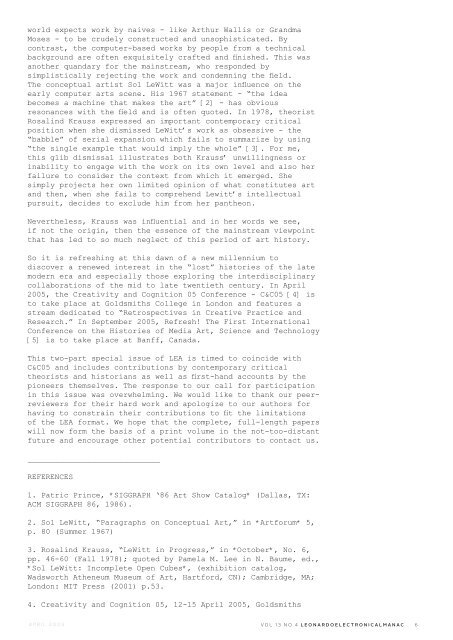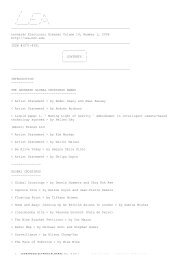Leonardo Electronic Almanac / Volume 13, No. 4 / April
Leonardo Electronic Almanac / Volume 13, No. 4 / April
Leonardo Electronic Almanac / Volume 13, No. 4 / April
You also want an ePaper? Increase the reach of your titles
YUMPU automatically turns print PDFs into web optimized ePapers that Google loves.
world expects work by naives - like Arthur Wallis or Grandma<br />
Moses - to be crudely constructed and unsophisticated. By<br />
contrast, the computer-based works by people from a technical<br />
background are often exquisitely crafted and finished. This was<br />
another quandary for the mainstream, who responded by<br />
simplistically rejecting the work and condemning the field.<br />
The conceptual artist Sol LeWitt was a major influence on the<br />
early computer arts scene. His 1967 statement - “the idea<br />
becomes a machine that makes the art” [2] - has obvious<br />
resonances with the field and is often quoted. In 1978, theorist<br />
Rosalind Krauss expressed an important contemporary critical<br />
position when she dismissed LeWitt’s work as obsessive - the<br />
“babble” of serial expansion which fails to summarize by using<br />
“the single example that would imply the whole” [3]. For me,<br />
this glib dismissal illustrates both Krauss’ unwillingness or<br />
inability to engage with the work on its own level and also her<br />
failure to consider the context from which it emerged. She<br />
simply projects her own limited opinion of what constitutes art<br />
and then, when she fails to comprehend Lewitt’s intellectual<br />
pursuit, decides to exclude him from her pantheon.<br />
Nevertheless, Krauss was influential and in her words we see,<br />
if not the origin, then the essence of the mainstream viewpoint<br />
that has led to so much neglect of this period of art history.<br />
So it is refreshing at this dawn of a new millennium to<br />
discover a renewed interest in the “lost” histories of the late<br />
modern era and especially those exploring the interdisciplinary<br />
collaborations of the mid to late twentieth century. In <strong>April</strong><br />
2005, the Creativity and Cognition 05 Conference - C&C05 [4] is<br />
to take place at Goldsmiths College in London and features a<br />
stream dedicated to “Retrospectives in Creative Practice and<br />
Research.” In September 2005, Refresh! The First International<br />
Conference on the Histories of Media Art, Science and Technology<br />
[5] is to take place at Banff, Canada.<br />
This two-part special issue of LEA is timed to coincide with<br />
C&C05 and includes contributions by contemporary critical<br />
theorists and historians as well as first-hand accounts by the<br />
pioneers themselves. The response to our call for participation<br />
in this issue was overwhelming. We would like to thank our peerreviewers<br />
for their hard work and apologize to our authors for<br />
having to constrain their contributions to fit the limitations<br />
of the LEA format. We hope that the complete, full-length papers<br />
will now form the basis of a print volume in the not-too-distant<br />
future and encourage other potential contributors to contact us.<br />
_____________________________<br />
REFERENCES<br />
1. Patric Prince, *SIGGRAPH ‘86 Art Show Catalog* (Dallas, TX:<br />
ACM SIGGRAPH 86, 1986).<br />
2. Sol LeWitt, “Paragraphs on Conceptual Art,” in *Artforum* 5,<br />
p. 80 (Summer 1967)<br />
3. Rosalind Krauss, “LeWitt in Progress,” in *October*, <strong>No</strong>. 6,<br />
pp. 46-60 (Fall 1978); quoted by Pamela M. Lee in N. Baume, ed.,<br />
*Sol LeWitt: Incomplete Open Cubes*, (exhibition catalog,<br />
Wadsworth Atheneum Museum of Art, Hartford, CN); Cambridge, MA;<br />
London: MIT Press (2001) p.53.<br />
4. Creativity and Cognition 05, 12-15 <strong>April</strong> 2005, Goldsmiths<br />
APRIL 2005 VOL <strong>13</strong> NO 4 LEONARDOELECTRONICALMANAC 6



